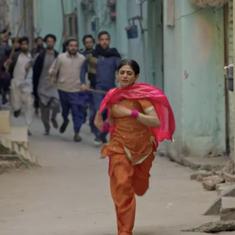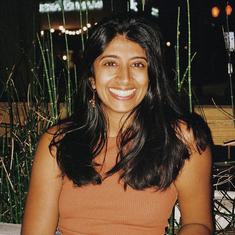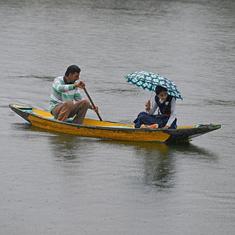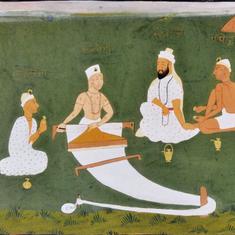In the video, which was apparently recorded with a smuggled mobile phone in his meter-wide cell in Ramo Verde Prison, López appears Christ-like in white, with a crucifix and beard. Tacked to the barred metal door are a snapshot of his family and a small Venezuelan flag.
Leopoldo López’s dispatch from jail.
The clip was first aired on La Hojilla, a tabloid-style state television show popular with chavistas (supporters of the former president, the late Hugo Chavez). Its host, Mario Silva, suggested that López was planning an escape.
Venezuela’s government has managed to keep López behind bars for 15 months now, even though it has not a shred of credible evidence against him. His trial has been repeatedly delayed and kept closed to the public. According to his wife, López has been held in isolation since he started his hunger strike and neither his family nor his lawyers have been allowed to visit him.
In cahoots
Before announcing his hunger strike in the video, López repeats his charges against the government’s bloody repression of the 2014 protests:
Many were killed in the hands of state security agencies, and groups linked to the government. These deaths today are wrapped in impunity and the complicity of the Venezuelan justice system with those in power.
López has been joined in his hunger strike by Daniel Ceballos, the deposed mayor of San Cristóbal, who was also arrested in connection with the massive 2014 protests.
Together, they are demanding the release of political prisoners, an end to persecution and censorship, and that the government stop dragging its feet on setting a date for the parliamentary elections meant to take place later in 2015. They have also demanded that the Organisation of American States and the European Union be allowed to observe the electoral process.
Right before the release of the López’s video, Ceballos was transferred from the Ramo Verde military prison (where he was held with López) to a prison for common criminals away from Caracas. The removal came one week after Ceballos won a primary to stand as an opposition candidate in the 2015 elections. Under Venezuelan law, winning the election and becoming a legislator could free him from prison, given that all legislators enjoy parliamentary immunity.
Rise up
In addition to announcing his hunger strike, López’s video called for a peaceful demonstration on May 30:
Venezuelan sisters and brothers, I want to call for us to have a demonstration, a strong, massive, peaceful demonstration, without any violence, on the streets of Venezuela this coming Saturday.
It remains to be seen whether Venezuelans will honour that call. When López supported the nationwide protests of early 2014, the authorities responded by killing dozens of demonstrators, injuring hundreds more and arresting López for “inciting violent acts.” Since then, many Venezuelans seem to have lost hope for any real change.
According to a retired school teacher from Caracas who prefers to remain unnamed, hyperinflation and shortages of basic goods keep people apathetic about politics. “We don’t have time to worry about the government,” she told us. “We spend our days going from one supermarket to the other, from one pharmacy to the other, queuing for hours to try to find food and medicines.”
Meanwhile, the exodus of young professionals keeps increasing: “My three nephews are gone. One went to Panamá, one to Spain and one to Chile. My family is sad and broken.”
According to Professor Iván de la Vega, a migration expert at Universidad Simón Bolívar in Caracas, more than 1.2m people (or 5% of Venezuela’s population) have left the country in recent years. Many are young professionals with university degrees who cite high crime rates as the main reason for their departures. Last year alone Venezuela had almost 25,000 homicides.
López knows that it is not easy to mobilise people when they are desperately struggling to survive. As he said in his video:
Let’s hold hands with our sisters and brothers without regard to ideology or party affiliation to demonstrate that we are on the side of change for Venezuela. Let’s go in peace and democracy. Let’s not lose hope, let’s not lose faith.
But while Venezuela’s endless state of crisis and breakdown will of course have sapped its people’s energy, it also seems to be coming to a head.
Brink of disaster
The Bank of America has estimated that inflation in Venezuela is pushing 200% a year, and the Venezuelan bolívar’s black market value has plunged from 300 per US dollar to over 400. Ricardo Hausmann, a Venezuelan economist at Harvard University, tweeted that this 32% devaluation is the largest in the country’s history.
Meanwhile, the US Drug Enforcement Administration announced on May 20 that Diosdado Cabello, Venezuela’s number two official and president of the National Assembly, is being investigated on drug trafficking charges.
As the announcement was made, and without any investigation the president, Nicólas Maduro, and his government expressed unconditional support for Cabello – this despite longstanding allegations that up to 90% of Colombian illegal drug shipments to the United States and Europe pass through Venezuelan ports.
Then, on May 23, an anti-drug squad arrested a suspected drug trafficker in Caracas airport. His travel companion was Supreme Court judge, Miriam Morandy, godmother to one of the first lady’s children, who was planning to travel with him to Portugal.
As the economic crisis tightens, Maduro is running out of options. If he wants to turn Venezuela back from the edge of oblivion Maduro will need to lift draconian foreign exchange controls, open up the economy, and request assistance from the IMF. If instead he chooses to maintain state control of the moribund economy, he will have to intensify the government repression that has defined his tenure.
Whether the protest that López has called for will really be the beginning of the end for Maduro’s regime is uncertain. But massive food shortages, skyrocketing crime and institutionalised corruption are all undeniable signals that the Bolivarian Revolution is falling apart.
This article was originally published on The Conversation.










